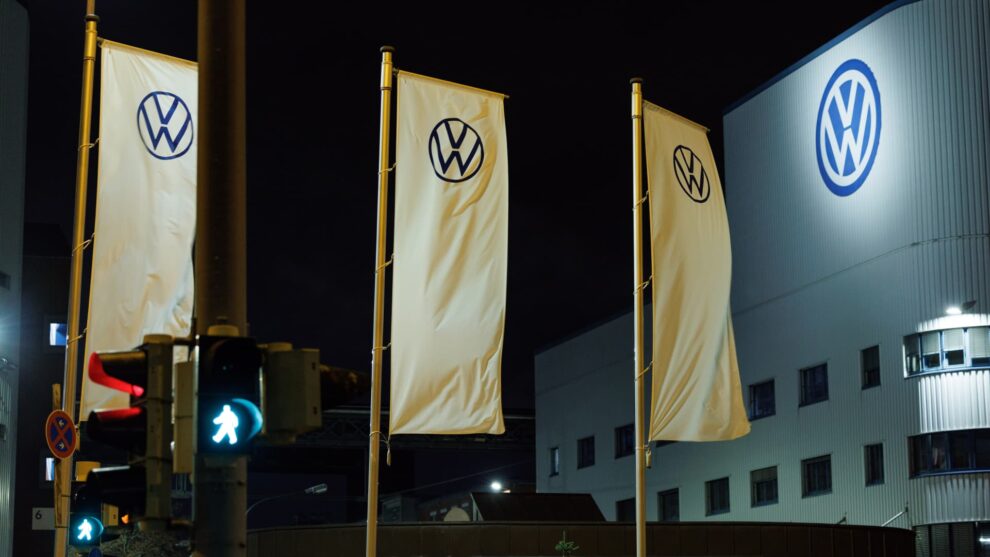Volkswagen Group reached a landmark agreement with labor unions Wednesday, announcing unprecedented workforce reductions and manufacturing changes that will fundamentally transform Europe’s largest automaker over the next decade. The deal, struck after months of tense negotiations, averts threatened strikes while charting a course through the industry’s challenging transition to electric vehicles.
The sweeping restructuring plan includes the phased reduction of more than 35,000 jobs across Volkswagen’s German operations through early retirement programs, voluntary buyouts, and natural attrition. This represents one of the most significant workforce adjustments in the company’s 87-year history and signals a dramatic shift in how traditional automakers are adapting to the electric future.
Hans Dieter Pötsch, Chairman of Volkswagen’s Supervisory Board, described the agreement as “painful but necessary” during the announcement at the company’s Wolfsburg headquarters. “These measures ensure Volkswagen’s competitiveness while maintaining our commitment to our workforce and German manufacturing heritage,” Pötsch stated.
The agreement comes after marathon negotiation sessions between VW management and IG Metall, Germany’s powerful metalworkers’ union. Union leaders initially opposed any job cuts but ultimately accepted the plan after securing guarantees of no forced redundancies before 2029 and commitments for substantial investments in worker retraining programs.
Daniela Schmidt, head of Volkswagen’s works council, emphasized the protections secured for workers: “While we acknowledge the necessity of adaptation, we’ve ensured that these changes will occur through socially responsible measures. Every affected worker will have opportunities for retraining or a dignified transition to retirement.”
The restructuring extends beyond workforce reductions. Volkswagen announced plans to convert several traditional manufacturing facilities to electric vehicle production, including its historic Wolfsburg plant. The company will invest €11 billion in modernizing its German factories, focusing on automation and electric vehicle manufacturing capabilities.
Industry analysts view the agreement as a watershed moment for Europe’s automotive sector. This deal sets a precedent for how traditional automakers can navigate the transition to electric vehicles while managing their existing workforce,” noted automotive analyst Michael Weber from Deutsche Bank Research. “Other manufacturers will likely follow Volkswagen’s blueprint.”
The timing of the announcement reflects mounting pressure on traditional automakers from multiple directions. Tesla’s expanding presence in Germany, growing competition from Chinese electric vehicle manufacturers, and stringent European Union emissions regulations have created an urgent need for traditional automakers to accelerate their electric vehicle transitions.
Financial markets responded positively to the news, with Volkswagen’s shares rising 3.5% in Frankfurt trading. Investors have long pressed for more aggressive cost-cutting measures to fund the company’s electric vehicle development programs and improve competitiveness against Tesla and Chinese rivals.
Local communities across Germany are grappling with the announcement’s implications. Cities like Wolfsburg, where Volkswagen employs a significant portion of the population, face particular challenges. Municipal leaders have announced plans to develop economic diversification strategies and attract new industries to offset the gradual reduction in automotive jobs.
The German federal government has pledged support for affected communities and workers. Economy Minister Robert Habeck announced plans for regional development grants and worker retraining programs, stating, “We must ensure that Germany’s transition to electric vehicle production strengthens, rather than weakens, our industrial communities.”
Environmental groups have generally welcomed the restructuring, seeing it as evidence of accelerating transition to electric vehicles. However, some have criticized the extended timeline, arguing that faster changes are needed to meet climate goals.
The agreement includes significant investments in worker retraining. Volkswagen will establish three new technical training centers focused on electric vehicle production, software development, and battery manufacturing. These facilities will offer certification programs for current employees seeking to transition to new roles within the company.
Supply chain implications extend beyond Volkswagen itself. Hundreds of smaller companies in Germany’s automotive supply chain must now accelerate their own transitions or risk losing business as their largest customer shifts production priorities. Industry associations estimate that up to 100,000 additional jobs in the broader automotive sector could be affected over the next decade.
Looking ahead, Volkswagen plans to begin implementing these changes immediately, with the first wave of early retirement offers going out in early 2024. The company expects to complete most major facility conversions by 2028, though workforce reductions will continue through 2029.
Global implications of this restructuring will likely resonate throughout the automotive industry as other manufacturers face similar challenges in transitioning to electric vehicle production. Volkswagen’s approach to managing this transition while maintaining social stability could serve as a model for other companies and countries grappling with industrial transformation.
















Add Comment